Program
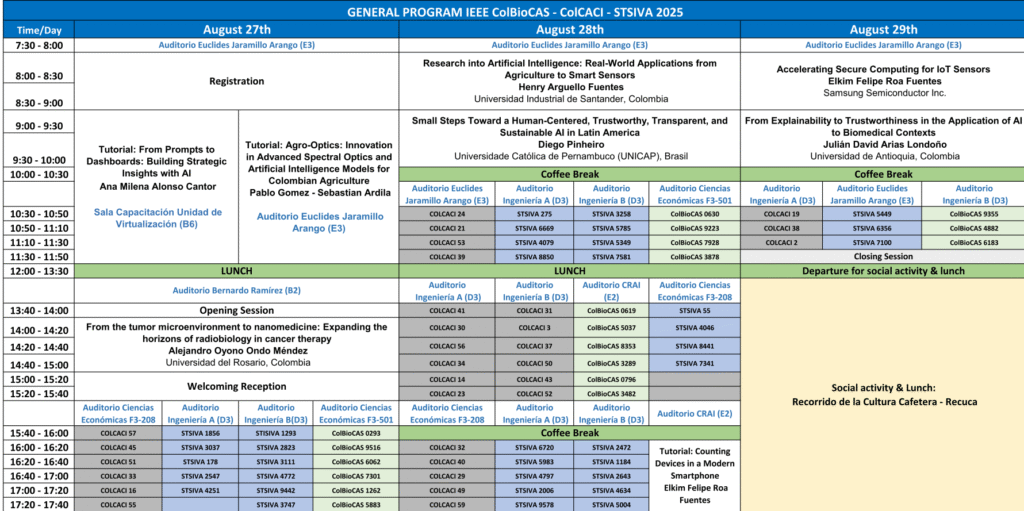
Download the program here
Map and location of the conference
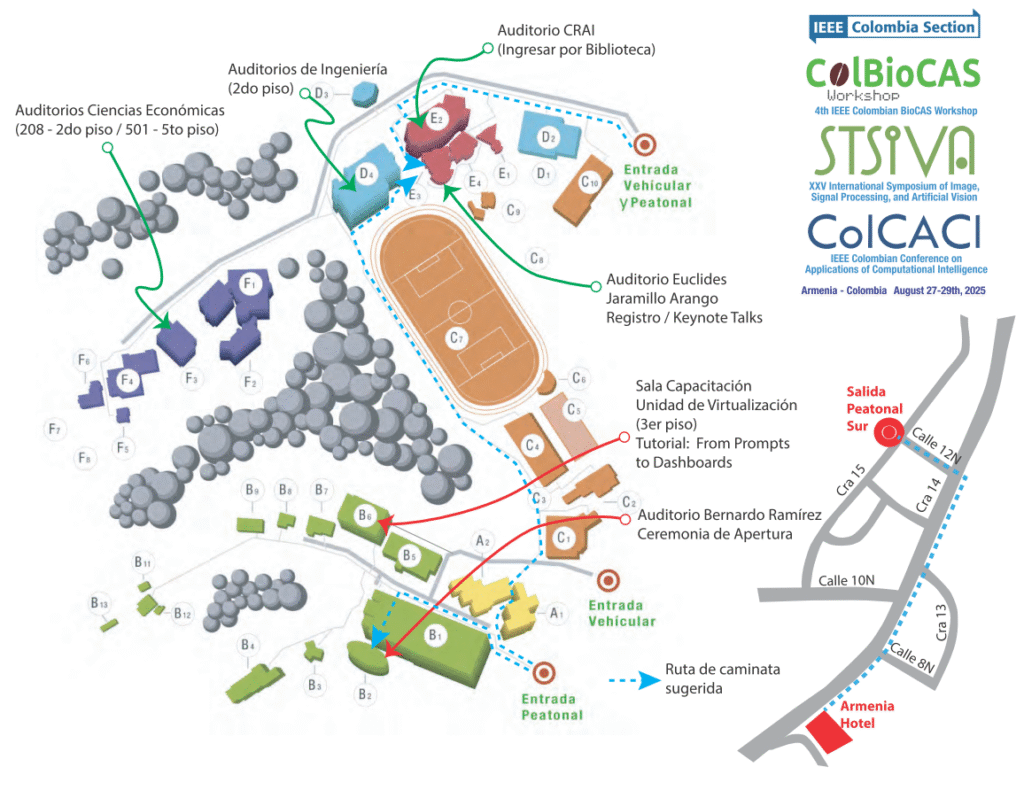
Download the map here
Keynote Speakers
 | Alejandro Oyono Ondo Méndez Universidad del Rosario, Colombia Bio Dr. Alejandro Oyono Ondo Méndez is a biologist from the Universidad Nacional de Colombia, PhD in Chemistry Sciences, Universidad Nacional de Colombia, and PhD in Life and Health Sciences, Université de Nice-Sophia Antipolis, France. He has an equivalence to the French DEA diploma in cellular and molecular pharmacology, Université de Nice-Sophia Antipolis, Nice, France. He has been a researcher at the Transporters in Imaging and Radiotherapy Oncology (TIRO) Unit of the French Atomic Energy Commission and at the Biophysics and Membrane Biology Group of the International Physics Center, conducting research on the molecular mechanisms involved in iodine transport in mammals. He is currently an associate professor at the School of Medicine and Health Sciences EMCS of the Universidad del Rosario. In addition, as a researcher in the Clinical Research group and director of the Research Seedbed in Biochemistry, Cancer, and Radiobiology (SiBio), he has developed research projects in translational medicine, studying the cellular and molecular mechanisms of tumor response to radiotherapy treatments. His laboratory carries out processes for the identification of cytotoxic and genotoxic effects of molecules and nanostructures aimed at cancer treatment and the evaluation of the biological effects of ionizing radiation in in vitro models that simulate tumor conditions. |
Talk: From the tumor microenvironment to nanomedicine: Expanding the horizons of radiobiology in cancer therapy
Abstract:
Radiobiology bridges fundamental science and clinical innovations in cancer therapy. This lecture will outline the fundamentals of radiation biology and its importance in clinical practice. Particular attention will be given to the tumor microenvironment as a critical modulator of therapeutic response, especially under hypoxic conditions that trigger metabolic adaptations and influence radiosensitivity. The talk will then explore innovative strategies, including the use of nanoparticles, to boost the efficacy of conventional radiotherapy and photodynamic therapy in challenging microenvironments. This presentation will also address emerging uses of non-ionizing radiation, including laser-based approaches for tissue regeneration, highlighting the expanding role of radiation in modern medicine.
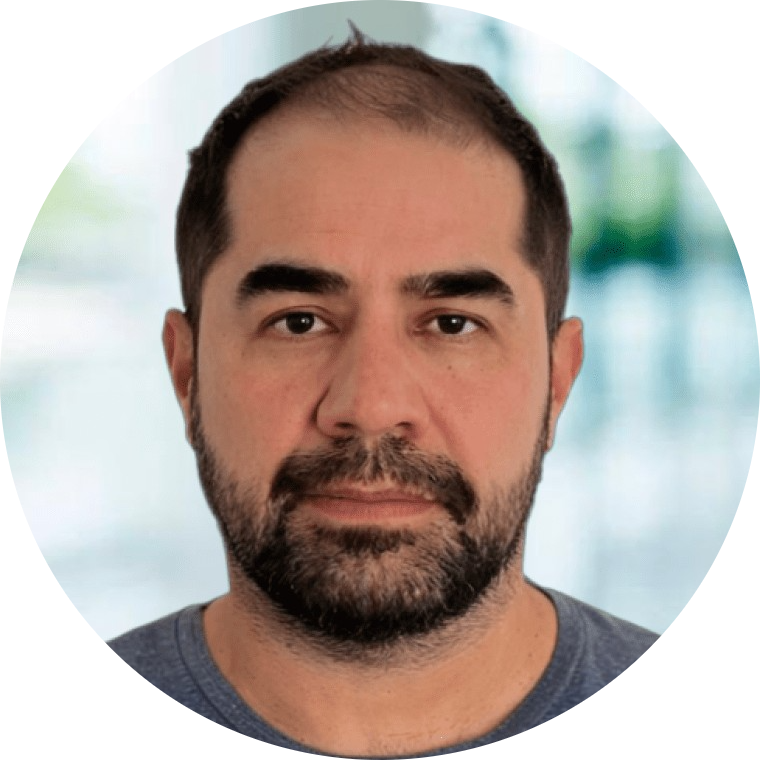 | Elkim Felipe Roa Fuentes Samsung Semiconductor Inc. Bio Elkim received his Ph.D. degree in Electrical and Computer Engineering from Purdue University in 2014, where he was a Fulbright Scholar, his M.S degree from the University of São Paulo, São Paulo, Brazil, and his bachelor’s degree in Electrical Engineering from Universidad Industrial de Santander, Colombia. He is currently a SoC Architect in Samsung Semiconductor Inc. working on computing acceleration for 4G/5G modems systems. Prior to Samsung, he has worked with Rambus Inc. and GlobalFoundries on high-speed communications, systems engineering for projects solving communications bandwidth and computing bottlenecks. He was an Associate Professor at Universidad Industrial de Santander from 2016 to 2021. His research interests include SoC architecture, high-speed interfaces, computing acceleration, and efficient AI computing. |
Talk: Accelerating Secure Computing for IoT Sensors
Abstract:
Security in IoT sensors has focused on cryptography-based but has failed to consider System-on-Chip (SoC) interoperability during side-channel, and physical attacks, as they concentrate solely on standalone behavior. This talk will discuss SoC security solutions that shield a SoC against supply voltage and physical attacks while apprising SoC interoperation. Along with the supply monitoring shields, this talk will present an efficient AES-256b encryption module accelerator, a physical unclonable function, and a true random number generator as SoC peripheral instances.
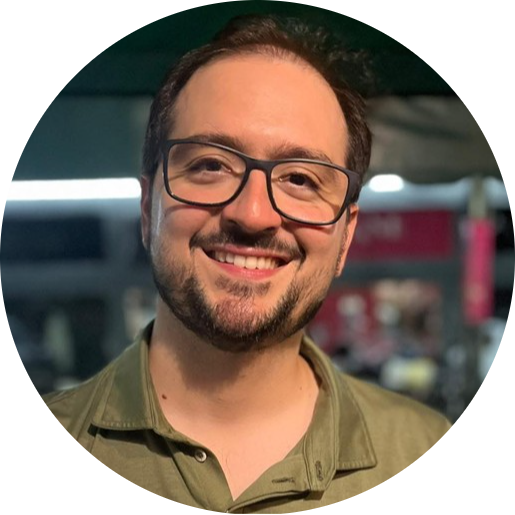 | Diego Pinheiro Universidade Católica de Pernambuco (UNICAP), Brasil Bio: Diego Pinheiro was born in Recife, Brazil. He holds a Ph.D. in Computer Science from the Florida Institute of Technology, USA (2018), where he was recognized as the Outstanding PhD Student of the Year in 2017. From 2018 to 2021, he completed a postdoctoral fellowship in Applied Computing for Medicine and Public Health at the Heart Failure Program in the Department of Internal Medicine at the University of California, Davis. Since March 2021, Diego has been a Professor of Computer Science at the Universidade Católica de Pernambuco (UNICAP), where he also leads the Laboratório de Pesquisa, Inovação e Desenvolvimento Inácio de Loyola (LoyolaLab). He is an affiliated professor in the Graduate Program in Computer Engineering (PPGEC) at Universidade de Pernambuco (UPE). Currently, he leads research on computational intelligence, data science, and network science—with applications in industry, medicine, and public safety—at the IoT & Data Atelier Research Group. He has successfully secured research funding through grant proposals developed in collaboration with health organizations such as the Rosenfeld Heart Foundation, Donate Life California, CareDx, and Pfizer, supporting data-driven research in medicine and public health. He is also co-founder of Vitally Health, a startup dedicated to improving heart failure patient care through data science solutions, which has received funding from the U.S. National Science Foundation (NSF). In addition, he has led state-funded technology extension projects in partnership with industry and startups, supported by FACEPE. Diego is actively involved in a research project aimed at advancing data-driven anomaly detection for fault diagnosis in industrial machines, funded by the Brazilian Ministry of Education (CAPES/STIC-AmSud), in collaboration with institutions from Brazil, Argentina, Ecuador, and France. He is also engaged in a project funded by the State of Pernambuco (FACEPE Cientista Arretado) focused on the development of AI-based Anti–Money Laundering Systems. Furthermore, he is a Senior Member of the Institute of Electrical and Electronics Engineers (IEEE) and served as General Chair of the 9th IEEE Latin America Conference on Computational Intelligence (LA-CCI) in 2023 and is an active member of technical committees for major artificial intelligence conferences such as BRACIS, CBIC, CompleNet, and LA-CCI. He serves as a reviewer for journals including Applied Soft Computing, Applied Network Science, PLOS ONE, IEEE Latin America Transactions, and Royal Society Open Science. He currently chairs the IEEE Task Force on Computational Intelligence in Latin America. |
Talk: Small Steps Toward a Human-Centered, Trustworthy, Transparent, and Sustainable AI in Latin America.
Abstract: This talk discusses foundational concepts and desirable properties of Artificial Intelligence, presenting ongoing research at the IoT & Data Atelier Research Group in Recife, Brazil, that represents small but meaningful steps toward explaining complex computational intelligence systems using network science, understanding the impact of data regularization on out-of-distribution generalization, advancing anomaly detection in industrial machines, promoting algorithmic fairness in missing data imputation for multivariate clinical time series, and detecting money laundering in bank transactions. The keynote advocates for the development of AI in Latin America that is trustworthy, transparent, sustainable, and human-centered.
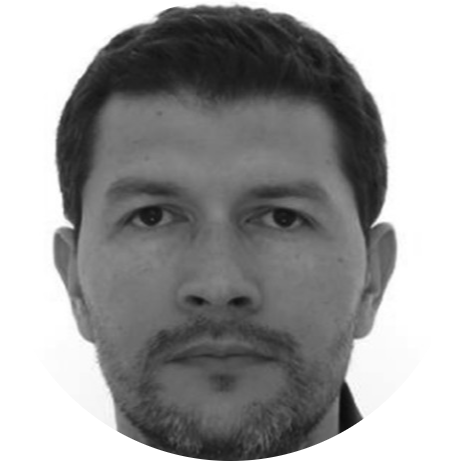 | Julián David Arias Londoño Universidad de Antioquia, Colombia Bio: Julián D. Arias Londoño was born in Manizales, Colombia. In 2010, he completed a dual PhD in Computer Science and Automatics from the Universidad Politécnica de Madrid (UPM), Spain, and the Universidad Nacional de Colombia, earning the European Doctorate Mention from the UPM. From 2010 to 2011, he served as an Assistant Professor in the Department of Electronic and Biomedical Engineering at Antonio Nariño University in Bogotá, Colombia. Since 2012, he has been with the Dept of Systems Engineering, Universidad de Antioquia, Medellín, Colombia, being appointed in 2020 as Full Professor. Between March 2022 and December 2024, Julián was with the Dept of Signals, Systems, and Radiocommunications at UPM, Spain, as a Visiting Scholar with a María Zambrano grant funded by the European Union NextGenerationEU program. His primary research focuses on artificial intelligence (AI) and machine learning, specifically in the application of these technologies to biosignal processing and the automatic classification of biological sequences. Julián also collaborates actively with neuroscience researchers, applying data analysis and AI techniques to metabolomic data to develop new biomarkers for characterizing neurodegenerative diseases and conditions. His most recent work focuses on designing computer-aided medical support systems based on AI techniques, equipped with interpretability tools to provide more reliable and trustworthy solutions within the medical context. He holds the title of Senior Researcher, as designated by the Colombian Ministry of Science, Technology, and Innovation, and is certified as R3 Researcher by the Spanish Research Agency. He is also a Senior Member of the Institute of Electrical and Electronics Engineers (IEEE), and a member of the ELLIS network. Julián has served as a reviewer for several specialized journals and conferences, including IEEE Trans. on Audio, Speech and Language Processing, Journal of the Acoustical Society of America, IEEE Journal of Selected Topics in Signal Processing (JSTSP), IEEE Trans. on Biomedical Engineering, Speech Communications, Artificial Intelligence in Medicine, NeurISP, ICML and ICLR; also he was part of the editorial committee of the Redin Journal (ISSN 2422-2844), Q3 in SCR, between 2014 and 2021 and has served as a guest editor for the IEEE JSTSP. |
Talk: From Explainability to Trustworthiness in the Application of AI to Biomedical Contexts.
Abstract:
Despite a decade of advances in AI for biomedical applications, clinical adoption remains limited. This talk examines the limitations of widely used explainability tools like saliency maps, questioning their real value in medical decision-making. We will explore persistent barriers to adoption — including data bias, lack of generalization, and shortcut learning — and highlight how these challenges are tied to overlooked domain and protected variables such as dataset provenance, device technology, and patient demographics. The keynote advocates for trustworthy AI through techniques like domain-adversarial training, Bayesian modeling, and diffusion models in latent spaces, paving the way for more robust, fair, and clinically reliable solutions.
 | Henry Arguello Universidad Industrial de Santander Bio Henry Arguello (henarfu@uis.edu.co) received his Ph.D. degree from the Electrical and Computer Engineering Department at the University of Delaware in 2013. He is currently a titular professor in the Systems Engineering Department, Universidad Industrial de Santander, Bucaramanga, Santander 680002, Colombia. He was a visiting Professor at Stanford funded by Fulbright. He is an Associate Editor for the IEEE Transactions on Computational Imaging. He was the Co-Chair and the Technical Co-Chair of several international conferences and workshops. His research interests include computational imaging techniques, high-dimensional signal coding and processing, and optical design. He is a Senior Member of IEEE. |
Talk: Research into Artificial Intelligence: Real-World Applications from Agriculture to Smart Sensors
Abstract: Artificial intelligence research drives the development of real-world solutions by integrating AI, intelligent sensors, and optical technologies to tackle key challenges in diverse areas such as precision agriculture, medical imaging, environmental monitoring, seismic imaging, and information security. This presentation highlights how interdisciplinary collaboration enables the creation of sensors capable of perceiving beyond human vision, systems that learn and adapt, and platforms that transform complex data into actionable insights. The showcased applications include smart sensing technologies for agriculture, privacy-preserving computer vision, medical diagnostics, and geophysical exploration.
TUTORIALS
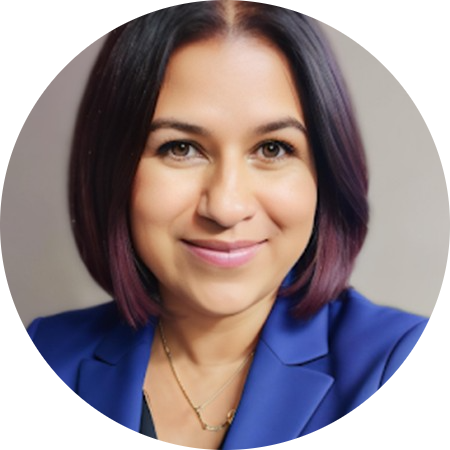 | Ana Milena Alonso Cantor Tutorial: From Prompts to Dashboards: Building Strategic Insights with AI Led by Ana Milena Alonso Cantor, a business consultant with over 15 years of experience in business intelligence, process optimization, and digital transformation, this hands-on workshop empowers professionals from any sector to harness the power of AI for data analysis—no technical background required. Ana Milena, a specialist in educational management and founder of the initiative “IA fácil para todos – Tribu IA,” is a passionate advocate for democratizing artificial intelligence. In this session, she guides participants through a practical and accessible journey: from crafting effective prompts to building an interactive, insight-rich dashboard. Designed for administrative, commercial, development, and marketing teams, this 2.5-hour experience transforms raw data into clear, actionable decisions using free AI tools. |

